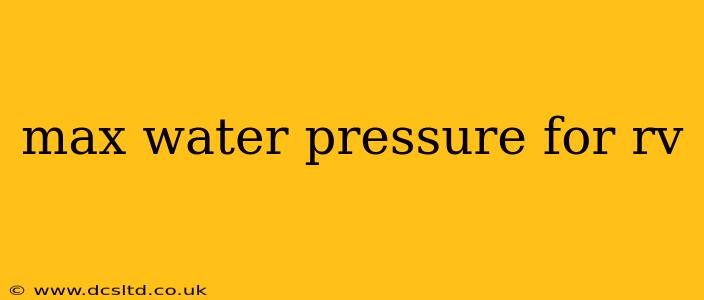Recreational vehicles (RVs) are designed for adventure, but their plumbing systems are surprisingly delicate. Understanding the maximum water pressure your RV can handle is crucial to preventing costly repairs and ensuring a smooth journey. Exceeding the recommended pressure can lead to burst pipes, damaged fittings, and leaks – all significant inconveniences, especially when miles from civilization. This guide will delve into the optimal water pressure for your RV, common issues related to water pressure, and steps you can take to protect your system.
What is the Maximum Water Pressure for an RV?
The generally accepted maximum water pressure for an RV is 50 PSI (pounds per square inch). However, it's vital to consult your RV's owner's manual. Many manufacturers specify a lower pressure limit, sometimes as low as 40 PSI. Ignoring this recommendation can void your warranty and lead to damage not covered under insurance. The pressure rating might even vary depending on the specific components of your RV's plumbing system.
What Happens if Water Pressure Exceeds the Limit?
Exceeding the maximum water pressure can result in several problems:
- Burst pipes: This is the most severe consequence. A burst pipe can cause significant water damage inside your RV, leading to costly repairs and potential mold growth.
- Damaged fittings: Connections and fittings throughout your plumbing system are vulnerable to high pressure. They can crack, leak, or even completely fail, leading to water loss and potential flooding.
- Leaks: Even without major damage, high pressure can create leaks in various parts of the system, such as around faucets, shower heads, and water pumps.
- Water heater damage: Your RV's water heater is particularly susceptible to high pressure, which can damage the tank or its components.
How to Monitor and Regulate RV Water Pressure?
Several methods can help you monitor and regulate the water pressure in your RV:
- Water Pressure Regulator: This is the most crucial piece of equipment. A water pressure regulator is an inline device that reduces the incoming water pressure to a safe level for your RV. It's highly recommended to install one, regardless of your campsite's water pressure.
- Pressure Gauge: A pressure gauge installed before the regulator allows you to monitor the incoming water pressure. This helps you see if the regulator is working correctly and if you need to adjust it.
- Check the Water Pressure at the Spigot: Before connecting to a water source, check the pressure at the spigot using a pressure gauge. This is especially helpful at campgrounds that are known for fluctuating water pressure.
- Regular Inspections: Periodically inspect your RV's plumbing system for any signs of leaks or damage. Early detection can prevent minor issues from escalating into major problems.
What if the Campground Water Pressure is Too High?
Many campgrounds have water pressure that exceeds the safe limit for RVs. In this situation, a water pressure regulator is absolutely essential. Without one, you risk damaging your RV's plumbing system. If you arrive at a campsite and the water pressure seems unusually high, use a pressure gauge to verify before connecting your RV.
How to Install a Water Pressure Regulator?
Installing a water pressure regulator is a relatively straightforward process, but if you're uncomfortable working with plumbing, it's best to consult a professional. Many RV repair shops and supply stores can install one for you.
Can Low Water Pressure Damage My RV?
While high water pressure is more damaging, consistently low water pressure can also cause problems. Low pressure might not immediately cause damage, but it can affect the performance of appliances like your water heater and shower. A low pressure situation warrants checking for leaks or blockages in the system.
What is the Average Water Pressure at Campgrounds?
Water pressure at campgrounds can vary greatly depending on location and infrastructure. It could range from as low as 20 PSI to well over 80 PSI. That's why having a pressure gauge and regulator is crucial for protecting your RV.
In conclusion, maintaining the correct water pressure is essential for the longevity and proper functioning of your RV's plumbing system. By following these guidelines and using the right equipment, you can ensure a trouble-free and enjoyable RV experience. Remember, always consult your RV's owner's manual for specific recommendations regarding water pressure.
